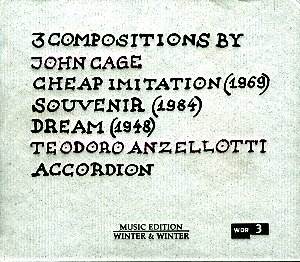Cage repeatedly expressed his admiration for
Satie. One can of course think of many reasons for this liking.
One of them may have been that he responded to Satie’s black humour
and iconoclastic, extravagant attitudes. These often impressed
at the expense of music that is frequently very fine, subtle and
harmonically refined in spite of the often humorous titles of
the pieces. Although I enjoy a good deal of Satie’s output, I
have never been able to respond to his symphonic drama Socrate
which I find a dull and dreary piece. Cage obviously had another
view of the piece that may have appealed to him because of its
Minimalism avant la lettre. Cheap Imitation
was composed in 1969 as a choreographic score for Merce Cunningham.
Originally Cage planned to transcribe Socrate for
two pianos. However, the French publishers refused to grant authorisation
to do so. Cage thus decided to write his own piece while preserving
the rhythmical patterns of Satie’s piece, since Cunningham’s choreography
had already been completely devised on Satie’s piece. Cheap
Imitation exists in several versions: one for violin,
one for piano and three other ones for orchestral forces of varying
size. I did not find any mention of the present version for accordion
in the catalogue of Cage’s publisher, so that I suppose that it
has been made by Teodoro Anzellotti. Cage’s music here is entirely
monodic, with – to me at least – a hint of plainsong, and moves
at a fairly moderate pace as does Satie’s original work.
In 1983, the American Guild of Organists asked
Cage to write an imitation of his early piece Dream
composed in 1948. Cage turned down the request and eventually
composed Souvenir in which the performer is given
considerable freedom in handling the notated material. The piece,
as played here, sounds rather minimalist and made me think of
Pärt at times. On the whole, it also moves at a quite moderate
pace, with very few brief outbursts.
The much earlier Dream was composed
for piano in 1948, also originally intended for a choreography
by Cunningham. The notated material bearing some semblance to
the Dies Irae again allows for a good deal of freedom on
the player’s part. This and Souvenir are heard here
in transcriptions for accordion (also by Anzellotti?), and I must
say that the present versions sound very well indeed.
This is obviously a disc that will not be to
everyone’s liking, depending on one’s reaction to Cage’s musical
world. Anzellotti’s immaculate readings, free from any vulgarity,
are simply breathtaking. Cage’s fans will need no further recommendation
and will be delighted to hear these unusual, but quite successful
transcriptions.
Hubert Culot
